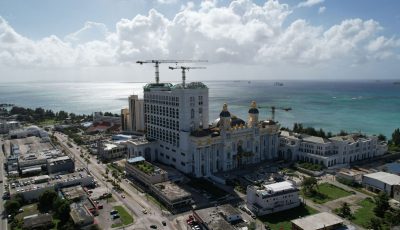Castle Projects OK’d to occupy barracks
Allowed to house illegal construction workers for humanitarian reasons
The Castle Projects (CNMI) LLC, a company that owns the renovated former garment factory in Tanapag that housed construction workers, including illegal aliens, for the multi-million Imperial Pacific International LLC’s ongoing casino and resort project in Garapan, was able to obtain on Friday a certificate of occupancy from the Department of Public Works.
Castle Projects counsel Michael Dotts also disclosed that the U.S. government allowed Castle Projects to let illegal aliens live in their housing without any fear of prosecution for humanitarian reasons.
Dotts gave a tour of Building B and other buildings of the Castle Projects barrack last Friday to show the improvements and the compliance made as a result of court action brought by DPW and the Office of the Attorney General.
With DPW issuing the certificate of occupancy on Friday, Castle Projects property manager Daniel Castro said they will move 60 to 70 construction workers back to Building B by yesterday, Monday.
Dotts said that Friday’s final inspection focused on the fire alarms.
“We have a brand new fire alarm system. It gives a warning throughout the housing but also transmits a warning to the main security guard center. So if there is fire in the building or smoke in the building, everyone would be notified. It was tested. It worked fine. DPW was there,” he pointed out.
Dotts said Building B is now certified to house 80 people. He said they can now move people housed at Buildings C and D to B.
The lawyer said if there are other people residing in other property that is unsafe, they will take them to Building B.
“Construction workers, tourist workers who came here improperly, for humanitarian reasons we want to take care of them. So we will take care of them at Building B. We will feed them in the kitchen. It’s good for them, it’s good for everybody,” he said.
Dotts said they have been working with the federal government and have allowed U.S. Labor to do interviews inside their commissary.
Dotts disclosed that the Immigration and Customs Enforcement as well as the Federal Bureau of Investigation have been at Castle Projects.
“This is a good place where government officials who need to meet the workers can come and find the workers,” he said.
Dotts said the information is readily available to the government. Under the system, he said, the government would know where to find all the people who needs to get repatriated, who needs to get their wages paid, or who needs to be taken cared of.
In regards to Castle Projects allowing the illegal aliens to stay there, Dotts said it is illegal to harbor an illegal alien, but they will not be charged for harboring illegal aliens who they are harboring right now.
“If new ones snuck in, then we will be in trouble. But the ones who are already on the island if we take care of them we’re not going to be charged for taking care of them,” Dotts said.
The lawyer said he heard that the illegal aliens include 150 from Beilida Overseas, 89 from MCC International, and 50 or more who are claiming to be MCC but may not be MCC.
Beilida Overseas, MCC International, Gold Mantis, and another company, who are either contractors or subcontractors for the casino/resort project, are housing their workers at Castle Projects.
Dotts said some workers had no charges and no allegations of unpaid wages.
Dotts said the Castle Projects’ property used to be Top Fashion Garment that had more than 300 workers.
The lawyer said the factory closed down in 2003 or 2004.
In 2015, he said, Castle Projects, which is owned by Taiwanese investors, was looking at Saipan because they knew that there was going to be a construction boom here.
Castle Projects purchased the property, renovated it, and got the zoning permit.
Dotts said the company improved building after building and got the proper permits.
For Building B, Dotts said that things got overlooked and people were already living in that building, and no occupancy permit was applied for it.
“That was the court issue,” said Dotts, explaining that the resolution of the court issue was to get everybody out of Building B until they get an occupancy permit.
Next up for an occupancy permit is Building A, where the second flood can house 140 employees.
Dotts said there was a period when there was no control at the property and nobody was doing the cleanup of the place.
“We just had too many people here who didn’t care, who just threw their trash, dumped cooking oil over the fence, improper stuff like that,” he said.
Dotts said last Feb. 28, there was a change in management at Castle Projects and the new management took control, hired a security contractor and a cleanup crew.
Dotts said Buildings D and C have expired occupancy permits that are up for renewals. “There is no reason they do not get renewed because nothing has changed,” he said.
Dotts said the Office of the Attorney General attached to the DPW’s complaint pictures of different housing and not Castle Projects’ housing.
Dotts said DPW also made an issue about a leaning wall.
Dotts said the leaning wall is actually not in their property, but it’s on public land and is leaning on the adjacent property.
“It should be torn down but it’s not this company’s leaning wall,” the lawyer noted.
Dotts said Saipan right now is having a construction boom.
“There is going to be a need for a lot of construction workers. So you have to ask where they going to live?” Dotts said. “The CNMI should be happy that we are doing this. That we are providing this housing for construction workers,” he said.
Dotts said Castle Projects wants to work with the CNMI government and does not want to break any laws.
“We want everything to be up to standards. We also want to provide a place for construction workers to live. So it’s good for everybody,” he added.
Some construction workers engaged in the ongoing casino and resort project in Garapan have been housed at the Castle Projects renovated property despite two notices of violation issued by DPW for occupying the building without obtaining a certificate of occupancy and failing to address deplorable unsanitary and dangerous conditions.
This prompted the CNMI government, through DPW acting Building Safety Official Casiano M. Bostre, to file a court action last month against Castle Projects.
At a hearing last March 17, Castle Projects, represented by Dotts, admitted that its former management violated the Building Safety Code when individuals were allowed to stay before a certificate of occupancy had been issued.
Castle Projects also admitted that the company had been issued notices of violation on Dec. 5, 2016, and Feb. 22, 2017.
Castle Projects agreed to vacate the building by March 20, 2017, and promised not to re-occupy the building until it received a certificate of occupancy.
At the continuation of the hearing last March 20, the parties informed the court that Castle Projects had vacated the building.
Assistant attorney general Matthew J. Pugh, counsel for Bostre, agreed to withdraw its motion for emergency ex parte temporary restraining order and motion for preliminary injunction in exchange for Castle Projects vacating the building and agreeing to obtain a certificate of occupancy prior to occupying the housing again.
Pursuant to the parties’ agreement, Superior Court Associate Judge Teresa Kim-Tenorio that same day ordered that Bostre’s motions are withdrawn.



























